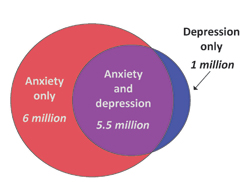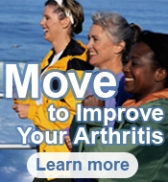Spotlight
One-Third of U.S. Adults with Arthritis have Anxiety or Depression
The physical and emotional consequences of arthritis are high

Findings from a newly released CDC report indicate that one third of U.S. adults with arthritis 45 years and older have either anxiety or depression. CDC also reported that anxiety was almost twice as common as depression. As shown in the figure on the right, most people who had depression (85%) also had anxiety. However, only 50% of the people who had anxiety also had depression. Clinical treatment and previous research studies have focused on the impact of depression among people with arthritis. The study results suggest that both anxiety and depression need to be addressed among people with arthritis.
There was not a specific pattern in the characteristics of those who had anxiety or depression. This suggests that everyone with arthritis may be at risk for emotional distress. Health care providers can help to reduce the high levels of emotional distress among people with arthritis by screening all adults with arthritis for anxiety and depression. Health care providers have an important role in identifying people with these mental health conditions because the study results found that 50% of those with anxiety and depression had not sought help for their mental distress in the past year.
Study results came from an analysis of CDC's Arthritis Conditions and Health Effects Survey (ACHES) data. This survey was conducted in 2005 and 2006 and was designed to provide results that represent U.S. adults aged 45 years and older with arthritis. The purpose of the survey was to increase understanding of the challenges that people with arthritis experience to help health care providers and public health practitioners better address the needs of those with arthritis. Nearly 1,800 adults were interviewed by telephone using a standardized questionnaire. ACHES collected information on various aspects of daily life with arthritis including arthritis symptoms, physical function, mental health, and confidence in ability to manage arthritis symptoms.
Fortunately there are many resources available to people with arthritis to reduce the emotional and physical consequences of arthritis. In addition to treatment from health care providers, physical activity has been proven to reduce arthritis pain and the symptoms of anxiety and depression. Convenient, low cost and educational workshops that help people gain control of their arthritis by learning techniques to reduce pain and limitations also have been shown to reduce anxiety and depression. For additional information on these and other ways people with arthritis can improve their physical and emotional aspects of arthritis, visit arthritis interventions and community-based mental health interventions.
Reference:
Murphy LB, Sacks JJ, Brady TJ, Hootman JM, Chapman DP. Anxiety is more common than depression among U.S. adults with arthritis. Arthritis Care Res . 2012; 64(7):968-976. abstract
More Information
- CDC Arthritis Program Physical Activity Overview
- The Arthritis Pain Reliever video
- CDC Arthritis Program recommended evidence-based programs
- CDC Physical Activity Web site
- Guide to Community Preventive Services: Promoting Physical Activity
- National Physical Activity Plan
- A National Public Health Agenda for Osteoarthritis
Get email updates
To receive email updates about this page, enter your email address:

Contact Us:
- Arthritis Program
Mailstop K-51
4770 Buford Hwy NE
Atlanta, GA 30341-3724
- Phone: 770.488.5464
Fax: 770.488.5964 - cdcinfo@cdc.gov


